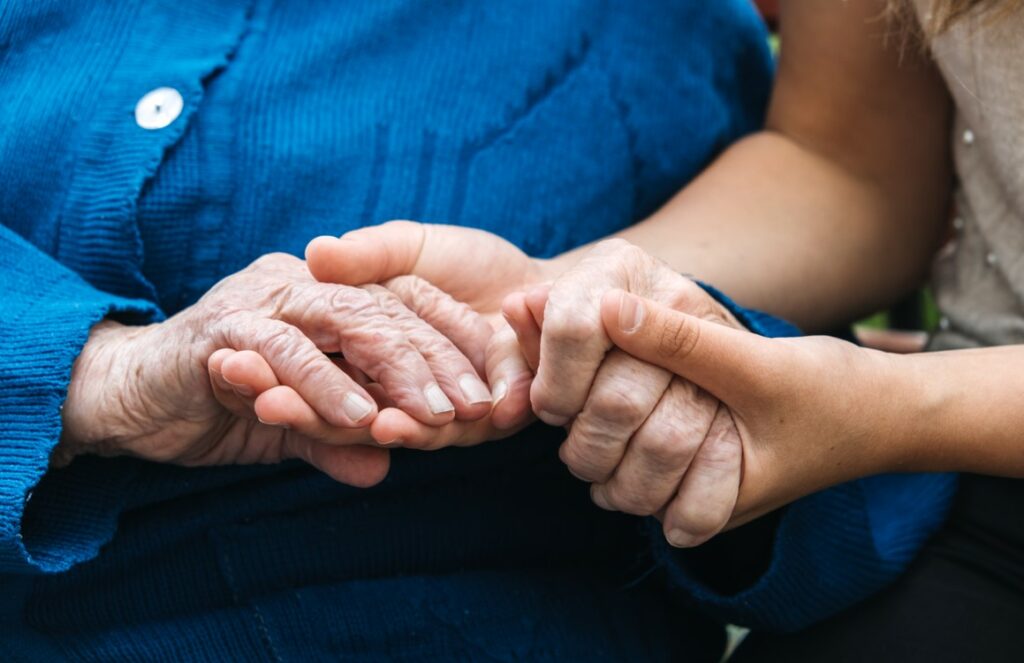The experience of caregiver burnout often represents a silent burden carried by those dedicating their days to the care of loved ones. Behind closed doors and forced smiles lies a complex reality marked by stress, fatigue, and loneliness. The stigma surrounding caregiver burnout only serves to intensify this burden, perpetuating a cycle of concealment and denial.

The Invisible Burden: Exploring the Emotional Weight of Caregiving
Caregiving, often lauded as a noble endeavor, carries an invisible burden that transcends the physical tasks involved. Beyond the practical duties lies a profound emotional weight that can profoundly impact the caregiver’s well-being. This emotional burden encompasses a range of complex feelings, including guilt, grief, anxiety, and loneliness.
Dr. Barry Jacobs, a clinical psychologist and expert in family caregiving, emphasizes the emotional toll of caregiving, stating, “Caregivers often struggle with conflicting emotions. They may feel guilty for feeling angry or resentful, or they may experience profound sadness as they witness their loved one’s decline.”
Are you experiencing emotional distress as a caregiver? Consider the following questions:
- Do you often feel overwhelmed or stressed by your caregiving responsibilities?
- Have you noticed a change in your mood, such as increased irritability or sadness?
- Do you struggle with feelings of guilt or inadequacy regarding your caregiving role?
- Have you experienced difficulty sleeping or changes in your appetite?
- Do you feel socially isolated or lonely due to your caregiving duties?
Consider the case of Sarah, who cares for her elderly mother with Alzheimer’s disease. Sarah experiences a constant sense of guilt, feeling torn between her responsibilities as a caregiver and her desire for personal fulfillment. She grapples with feelings of inadequacy, wondering if she’s doing enough for her mother while neglecting her own needs.
Moreover, caregivers often navigate the grieving process as they witness the decline of their loved ones’ health. Dr. Susan Scott, a geriatrician specializing in caregiver support, notes, “Caregivers experience anticipatory grief as they witness the gradual loss of their loved one’s abilities. This ongoing sense of loss can be emotionally draining and challenging to cope with.”
Are you struggling to cope with anticipatory grief? Consider these strategies:
- Seek out support from friends, family, or a therapist who can offer guidance and understanding.
- Engage in activities that bring you joy and fulfillment outside of your caregiving responsibilities.
- Practice self-compassion and allow yourself to feel and express your emotions without judgment.
- Consider joining a support group for caregivers where you can connect with others who understand your experiences.
- The emotional weight of caregiving can also manifest in anxiety and stress. Jane, who cares for her husband with Parkinson’s disease, describes feeling constantly on edge, worrying about his health and safety. She struggles to find moments of respite amid the relentless demands of caregiving.
Are you experiencing anxiety or stress as a caregiver? Try the following coping strategies:
- Practice relaxation techniques such as deep breathing, meditation, or yoga to reduce stress levels.
- Set boundaries and prioritize self-care by carving out time for activities that recharge and rejuvenate you.
- Reach out for help and delegate tasks when feeling overwhelmed. Remember, it’s okay to ask for support.
- Stay connected with friends and loved ones who can provide emotional support and companionship.
To address the emotional burden of caregiving, experts emphasize the importance of self-care and support. Dr. James Johnson, a psychiatrist specializing in caregiver mental health, emphasizes, “Caregivers must prioritize their own well-being to effectively support their loved ones. This involves seeking support from friends, family, and support groups, as well as engaging in activities that bring them joy and fulfillment.”
In conclusion, the emotional weight of caregiving is a multifaceted experience that profoundly impacts caregivers’ lives. By recognizing and addressing this burden, caregivers can cultivate resilience and find strength amidst the challenges they face.
Key Concepts:
Emotional Toll: Caregiving involves a range of complex emotions, including guilt, grief, anxiety, and loneliness.
Conflicting Emotions: Caregivers often struggle with conflicting feelings, such as guilt for feeling angry or resentful, and profound sadness as they witness their loved one’s decline.
Anticipatory Grief: Caregivers experience anticipatory grief as they witness the gradual loss of their loved one’s abilities, which can be emotionally draining.
Anxiety and Stress: Caregiving can lead to anxiety and stress, as caregivers worry about their loved one’s health and safety while navigating the relentless demands of caregiving.
Self-Care and Support: Prioritizing self-care and seeking support from friends, family, and support groups are crucial for caregivers to effectively support their loved ones and maintain their own well-being.

Stereotypes and Realities: Debunking Perceptions About Caregiving
COMMON STEREOTYPES ABOUT CAREGIVING:
Caregiving is solely a familial duty:
- Stereotype: Caregiving is often perceived as an obligation solely belonging to family members, particularly women.
- Reality: While family caregivers play a significant role, caregiving responsibilities are not limited to family members. Professional caregivers, friends, and volunteers also contribute to caregiving efforts.
Caregivers are selfless heroes who sacrifice everything for their loved ones:
- Stereotype: Caregivers are often portrayed as selfless individuals who sacrifice their own needs and desires for the sake of their loved ones.
- Reality: While caregivers demonstrate remarkable dedication and compassion, they also have their own needs and limitations. Ignoring their own well-being can lead to burnout and resentment.
Caregiving is primarily physical care:
- Stereotype: Caregiving is often equated with physical tasks such as bathing, feeding, and medication management.
- Reality: Caregiving encompasses a wide range of responsibilities, including emotional support, financial management, advocacy, and navigating complex healthcare systems.
DEBUNKING STEREOTYPES:
Recognizing the diversity of caregivers:
Caregivers come from diverse backgrounds and may have different relationships with the care recipient. It’s essential to acknowledge and respect the varied experiences and challenges faced by caregivers.
Valuing the emotional labor of caregiving:
Emotional support and companionship are integral aspects of caregiving that often go unrecognized. Acknowledging the emotional labor involved in caregiving helps validate caregivers’ experiences and contributions.
Promoting self-care and well-being:
Caregivers should prioritize their own well-being and seek support when needed. Encouraging self-care practices and providing access to resources can help prevent burnout and support caregivers in their role.
MISCONCEPTIONS ABOUT CAREGIVERS:
Caregivers are always willing and able to provide care:
- Misconception: Caregivers are always willing and able to provide care, regardless of their own circumstances or limitations.
- Reality: Caregivers may face barriers such as financial constraints, health issues, or competing responsibilities that impact their ability to provide care.
Caregivers are immune to stress and emotional strain:
- Misconception: Caregivers are immune to stress and emotional strain due to their perceived selflessness and dedication.
- Reality: Caregivers experience significant stress and emotional strain, which can have detrimental effects on their mental and physical health if left unaddressed.

Strategies to Challenge and Overcome the Stigma of Caregiver Burnout
- Educate Yourself:
Take the time to learn about caregiver burnout, its signs, symptoms, and potential impact on your well-being. Understanding the factors contributing to burnout can empower you to take proactive steps to prevent it.
- Recognize Your Limits:
Be honest with yourself about your capabilities and limitations as a caregiver. It’s essential to acknowledge when you’re feeling overwhelmed or experiencing burnout and to seek support when needed.
- Prioritize Self-Care:
Make self-care a priority in your daily routine. Set aside time for activities that recharge and rejuvenate you, whether it’s exercise, meditation, spending time with loved ones, or pursuing hobbies.
- Set Boundaries:
Establish clear boundaries between your caregiving responsibilities and your personal life. Learn to say no to additional commitments or requests that may contribute to burnout and prioritize your own well-being.
- Seek Support:
Don’t hesitate to reach out for support from friends, family members, support groups, or healthcare professionals. Connecting with others who understand your experiences can provide validation, empathy, and practical advice.
- Communicate Your Needs:
Advocate for yourself and communicate your needs openly and assertively with others. Whether it’s asking for help with caregiving tasks, setting boundaries with family members, or seeking accommodations at work, don’t be afraid to speak up.
- Utilize Available Resources:
Take advantage of resources and services available to caregivers, such as respite care, counseling, caregiver support groups, and community organizations. These resources can offer valuable assistance and support tailored to your needs.
- Practice Mindfulness:
Cultivate mindfulness and present-moment awareness to manage stress and reduce feelings of anxiety and overwhelm. Mindfulness techniques such as deep breathing, meditation, and guided imagery can help you stay grounded and centered.
- Advocate for Change:
Be a voice for change by advocating for policies and initiatives that support caregivers’ rights and well-being. Participate in caregiver advocacy organizations, share your story, and raise awareness about the challenges caregivers face.
- Celebrate Your Strengths:
Recognize and celebrate your strengths as a caregiver. Acknowledge the compassion, dedication, and resilience you bring to your role, and give yourself credit for the difference you make in your loved one’s life.
Embracing Community Care: Exploring the Role of Senior Living in Supporting Caregivers
At Oakview Park, we understand the profound impact that caregiving can have on individuals and families. As a senior living community dedicated to providing compassionate care and support, we recognize the importance of embracing community care and the role it plays in supporting caregivers.
- Respite Care Services:
We offer respite care services designed to provide temporary relief for caregivers who need time to recharge and attend to their own needs. Whether it’s for a few hours, a day, or longer, caregivers can trust Oakview Park to provide their loved ones with personalized care and attention in a safe and nurturing environment.
- Supportive Community Environment:
Oakview Park prioritizes creating a supportive community environment where seniors and their caregivers feel valued, respected, and connected. Our team is dedicated to fostering meaningful relationships and providing emotional support to both residents and their families.
- Educational Programs and Resources:
We understand that caregivers may benefit from additional support and resources to navigate the challenges of caregiving. Oakview Park offers educational programs, workshops, and support groups specifically tailored to the needs of caregivers, providing them with valuable information, skills, and strategies to enhance their caregiving experience.
- Collaborative Care Approach:
Our experienced team at Oakview Park takes a collaborative care approach, working closely with caregivers to develop personalized care plans that meet the unique needs and preferences of each resident. By fostering open communication and collaboration, we ensure that caregivers feel supported and empowered in their caregiving journey.
- Promoting Self-Care for Caregivers:
We recognize the importance of promoting self-care for caregivers to maintain their own health and well-being. Oakview Park offers resources and encouragement for caregivers to prioritize self-care practices, such as mindfulness, relaxation techniques, and engaging in activities that bring them joy and fulfillment.
- Celebrating Caregivers:
At Oakview Park, we celebrate the dedication and compassion of caregivers who tirelessly support their loved ones. We honor their contributions and recognize the invaluable role they play in the lives of seniors in our community.
In conclusion, Oakview Park is committed to embracing community care and supporting caregivers in their important role. Through respite care services, a supportive community environment, educational programs, collaborative care approaches, promoting self-care, and celebrating caregivers, we strive to empower caregivers and enhance their caregiving experience.








